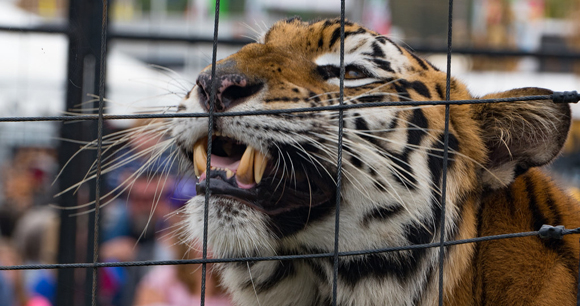
Washington, DC—On International Tiger Day, the US House of Representatives passed the Big Cat Public Safety Act late Friday by a vote of 278-134, aiming to end several abusive practices associated with keeping big cats in captivity. The Animal Welfare Institute (AWI) endorses H.R. 263, which is sponsored by Representatives Mike Quigley (D-IL) and Brian Fitzpatrick (R-PA), and cosponsored by a bipartisan group of 257 other representatives.
First introduced in 2012, the Big Cat Public Safety Act would prohibit private individuals from possessing lions, tigers, leopards, cheetahs, jaguars, cougars, or any hybrid of these species. This prohibition would only apply to big cats kept as pets—sanctuaries, universities, and zoos would be exempt. Current big cat owners would be grandfathered in but would be required to register their animals in order to alert first responders and animal control officers that these dangerous cats are being held in their communities.
Additionally, the bill would prohibit public petting, playing with, feeding, and photo ops with cubs. The profit derived from encouraging the public to handle and pose with cubs is the primary driver of surplus tigers flooding the exotic animal trade in the United States, resulting in untold numbers of animals being subjected to trauma and abuse.
In the wake of the Netflix docuseries “Tiger King” and heightened public attention to the exploitation of captive big cats, the House overwhelmingly passed the Big Cat Public Safety Act in 2020, but the Senate failed to take up the bill.
Thousands of big cats are thought to be in private hands, and they pose a serious threat to public safety, as well as to first responders who must risk their lives when these animals escape or attack. There have been thousands of dangerous incidents involving pet big cats, sometimes resulting in people being severely injured and even killed. As a result, the Big Cat Public Safety Act has been endorsed by a large number of law enforcement organizations and officers.
Big cats are wild animals who suffer when people attempt to keep them as pets. By the time they are fully grown, they are too strong and dangerous for private owners to manage. Consequently, the animals are frequently neglected and locked away in barren cages with barely enough room to move. Proper care and diet are also very expensive, so the cats are often malnourished and unhealthy.
“There is simply no reason why anyone should keep a tiger or lion in their house,” said Cathy Liss, president of AWI. “We know how much these big cats suffer when they are ripped from their mothers as infants and traumatized for cub petting; they often end up in tiny backyard cages for the rest of their lives. It’s time to end this national embarrassment, and I thank Congressmen Quigley and Fitzpatrick for their tireless efforts to pass the Big Cat Public Safety Act and protect both big cats and the public from this tragic trade.”
“Ultimately, this legislation is about public safety. Any American can imagine the danger that exotic cats can pose. These are predators, not pets. Law enforcement has long advocated for legislation that will keep dangerous wild animals out of their communities and reduce the risk to first responders and the animals themselves,” Quigley said. “I have been proud to work alongside law enforcement groups and animal organizations to ensure this bill will make both neighborhoods and animals safer. For too long, lax laws have allowed private citizens to own big cats. The animals subject to these grotesque conditions deserve better. I hope my colleagues in the Senate will swiftly take up this legislation so we can make a difference for communities across the country and save these animals from a life of confinement and restriction.”
"As a member of the bipartisan Congressional Animal Protection Caucus, I am committed to ensuring our government is doing its part to promote animal welfare," said Fitzpatrick. "For too long, big cats have been mistreated, exploited, and abused in private roadside zoos. Our Big Cat Public Safety Act will prohibit the unlicensed, private possession of big cats and restrict their direct contact with the public, and I am proud to again join Congressman Quigley in championing this bipartisan bill."
Margie Fishman, Animal Welfare Institute
[email protected], (202) 446-2128
The Animal Welfare Institute is a nonprofit charitable organization founded in 1951 and dedicated to reducing animal suffering caused by people. AWI engages policymakers, scientists, industry, and the public to achieve better treatment of animals everywhere—in the laboratory, on the farm, in commerce, at home, and in the wild. Follow us on Facebook, Twitter, and Instagram for updates and other important animal protection news.